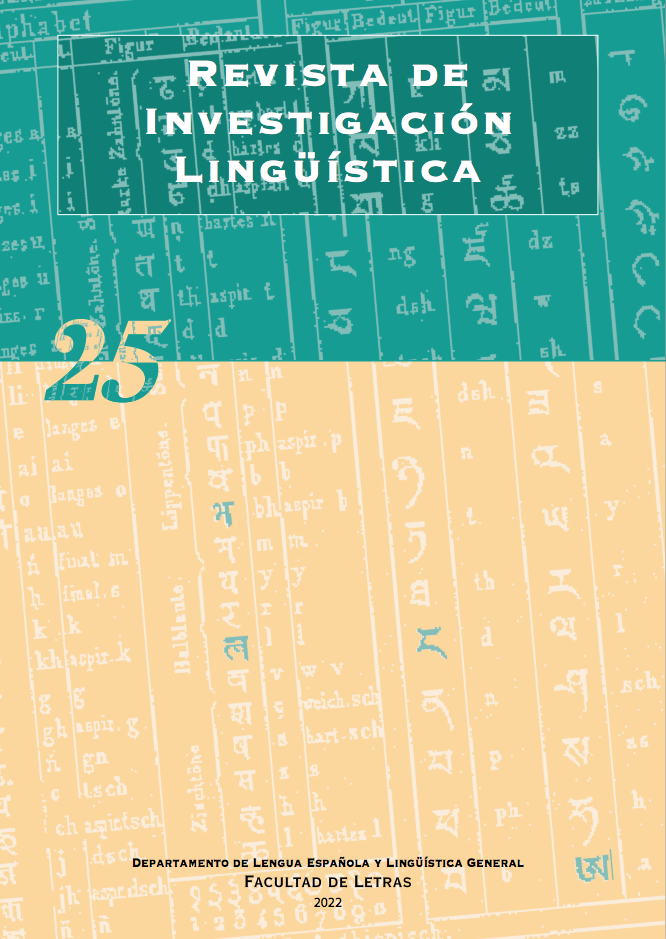Distributividad recalcitrante y nombres colectivos
Resumen
Los predicados recalcitrantemente distributivos son aquellos que, combinados con pluralidades, se aplican exclusivamente a los individuos particulares y nunca al conjunto (Estas cajas son largas). Estos predicados pueden combinarse con algunos nombres no contables o masa (arroz largo), si contienen unidades aislables, pero sorprendentemente nunca dan la misma lectura con nombres colectivos (#alameda larga). Este trabajo propone que esta restricción tiene una base sintáctica: la posición en la que ha de introducirse un predicado distributivo interrumpe el constituyente que forma el nombre colectivo, pero no el que se asocia a un nombre no contable.
Descargas
-
Resumen555
-
PDF612
Citas
BAKER, Mark C. (2002): Lexical categories, Cambridge, Cambridge University Press.
BAUNAZ, Lena y Eric LANDER (2018): «Nanosyntax: The Basics», en Lena Baunaz, Liliane Haegeman, Eric Lander y Karen DeClercq (eds.), Exploring Nanosyntax, Oxford, Oxford University Press, pp. 1-48. DOI: https://doi.org/10.1093/oso/9780190876746.003.0001.
BORER, Hagit (2005): In name only, Oxford, Oxford University Press.
BORER, Hagit (2013): Taking form, Oxford, Oxford University Press. DOI: https://doi.org/10.1093/acprof:oso/9780199263936.001.0001.
CAHA, Pavel (2009): The nanosyntax of case, Tesis doctoral, Universidad de Tromsø.
CHIERCHIA, Gennaro (1998): «Plurality of mass nouns and the notion of “semantic parameter”», en Susan Rothstein (ed.), Events and grammar, Dordrecht, Kluwer, pp. 53-103. DOI: https://doi.org/10.1007/978-94-011-3969-4_4.
CINQUE, Guglielmo (2010): The Syntax of Adjectives, Cambridge (Mass.), MIT Press. DOI: https://doi.org/10.7551/mitpress/9780262014168.001.0001.
FÁBREGAS, Antonio (2007): «The Exhaustive Lexicalisation Principle», en Mónica Basic, Marina Pancheva, Minjeong Song y Peter Svenonius (eds.), Nordlyd 34. Special Issue on Space, Motion and Result, Tromsø, CASTL, University of Tromsø, pp. 165-199. DOI: https://doi.org/10.7557/12.110.
HIGGINBOTHAM, James y Barry SCHEIN (1989): «Plurals», en Jim Carter y Rosa-Marie Déchaine (eds.), Proceedings of NELS 19, Amherst (Mass.), Graduate Linguistics Students Association, University of Massachusetts, pp. 161-175.
JACKENDOFF, Ray (1991): «Parts and boundaries», Cognition, 41, pp. 9-45. DOI: https://doi.org/10.1016/0010-0277(91)90031-X.
LANDMAN, Fred (2021): «Iceberg semantics for count nouns and mass nouns», en Hanna Filip (ed.), Countability in natural language, Oxford, Oxford University Press, pp. 161-199. DOI: https://doi.org/10.1017/9781316823774.008.
LINK, Godehard (1983): «The logical analysis of plurals and mass terms», en Rainer Bäuerle, Christopher Schwarze y Armin von Stechow (eds.), Meaning, use, and interpretation of language, Berlín, de Gruyter, pp. 302-323.
MORREALE, Margarita (1973): «Aspectos gramaticales y estilísticos del número», Boletín de la Real Academia Española, 53, pp. 99-206.
PELLETIER, Francis Jeffry (1975): «A bibliography of recent work on mass terms», Synthese, 31, pp. 523-526. DOI: https://doi.org/10.1007/BF00485220.
PELLETIER, Francis Jeffry (1979): Mass Terms: Some Philosophical Problems, Dordrecht, Reidel. DOI: https://doi.org/10.1007/978-1-4020-4110-5.
PICALLO, Carme (2017): «A note on the locus and function of formal gender», Borealis, 6, pp. 1-20. DOI: https://doi.org/10.7557/1.6.1.4097.
QUINE, Willard van Orman (1960): Word and object, Cambridge (Mass.), MIT Press.
RAE y ASALE (2009): Nueva gramática de la lengua española, Madrid, Espasa.
RAMCHAND, Gillian (2008): Verb meaning and the lexicon, Cambridge, Cambridge University Press. DOI: https://doi.org/10.1017/CBO9780511486319.
ROTHSTEIN, Susan (2010): «Counting and the Mass/Count Distinction», Journal of Semantics, 27, pp. 343-397. DOI: https://doi.org/10.1093/jos/ffq007.
SCHWARZSCHILD, Robert (2011): «Stubborn distributivity, multiparticipant nouns and the count/mass distinction», en Suzi Lima, Kevin Mullin, y Brian Smith (eds.), Proceedings of NELS 39, Amherst (Mass.), Graduate Linguistics Students Association, University of Massachusetts, pp. 661-678.
SCONTRAS, Gregory y Noah D. GOODMAN (2017): «Resolving uncertainty in plural predication», Cognition, 168, pp. 294-311. DOI: https://doi.org/10.1016/j.cognition.2017.07.002.
SPROAT, Richard y Chilin SHIH (1988): «Prenominal Adjectival Ordering in English and Mandarin», North East Linguistics Society, 18, pp. 465-489.
SVENONIUS, Peter (2008): «The position of adjectives and other phrasal modifiers in the decomposition of DP», en Louise McNally y Chris Kennedy (eds.), Adjectives and adverbs, Oxford, Oxford University Press, pp. 16-42.
SYRETT, Kristen y Julian MUSOLINO (2013): «Collectivity, distributivity, and the interpretation of plural numerical expressions in child and adult language», Language Acquisition, 20, pp. 259-291. DOI: https://doi.org/10.1080/10489223.2013.828060.
VÁZQUEZ ROJAS MALDONADO, Violeta (2012): The syntax and semantics of Purépecha noun phrases and the mass/count distinction, Tesis doctoral, New York University.
ZHANG, Niina Ning (2013): Classifier Structures in Mandarin Chinese, Berlín, Mouton de Gruyter. DOI: https://doi.org/10.1515/9783110304992.
Derechos de autor 2022 Revista de Investigación Lingüística

Esta obra está bajo una licencia internacional Creative Commons Atribución-NoComercial-SinDerivadas 4.0.
Las obras que se publican en esta revista están sujetas a los siguientes términos:
1. El Servicio de Publicaciones de la Universidad de Murcia (la editorial) conserva los derechos patrimoniales (copyright) de las obras publicadas, y favorece y permite la reutilización de las mismas bajo la licencia de uso indicada en el punto 2.
2. Las obras se publican en la edición electrónica de la revista bajo una licencia Creative Commons Reconocimiento-NoComercial-SinObrasDerivadas 4.0 (texto legal). Se pueden copiar, usar, difundir, transmitir y exponer públicamente, siempre que: i) se cite la autoría y la fuente original de su publicación (revista, editorial y URL de la obra); ii) no se usen para fines comerciales; iii) se mencione la existencia y especificaciones de esta licencia de uso.
3. Condiciones de auto-archivo. Se permite y se anima a los autores a difundir electrónicamente las versiones pre-print (versión antes de ser evaluada) y/o post-print (versión evaluada y aceptada para su publicación) de sus obras antes de su publicación, ya que favorece su circulación y difusión más temprana y con ello un posible aumento en su citación y alcance entre la comunidad académica. Dulcinea: verde. OPF.










